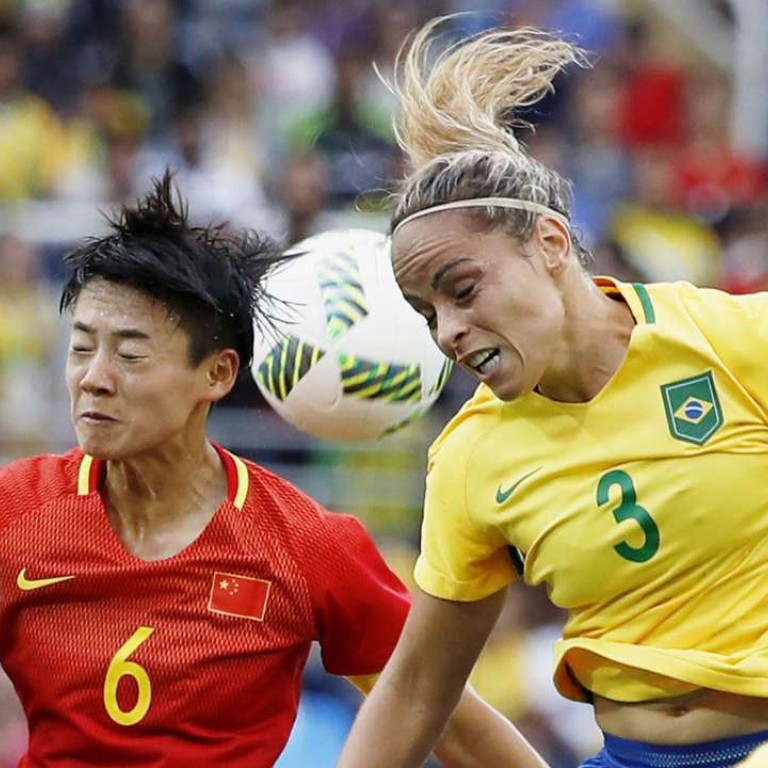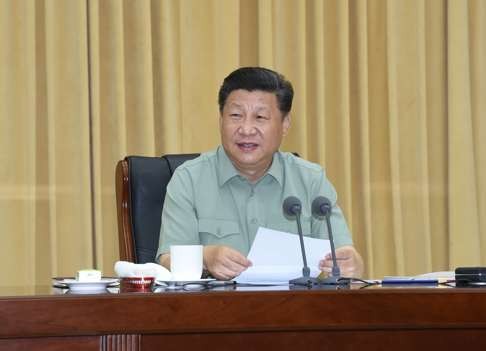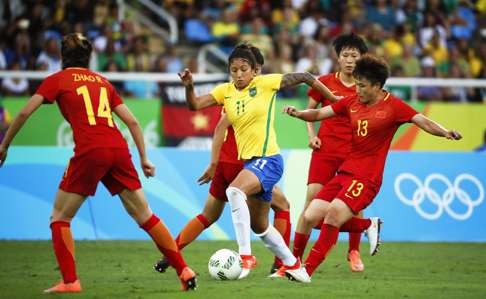
Brazil show China's Olympic players that footballing culture has to be bred, not bought
A glamour tie in Rio was just the tonic for president Xi’s soccer revolution – until the result showed the gulf that separates them, and reiterated how money alone can’t bridge that gap
Brazil v China in Rio at a major tournament: the kind of fixture the country – or Xi Jinping at least – dreams of.
This was the women’s game though, rather overlooked in China’s mad quest to throw as much money as they possibly can at anything vaguely football-related. The hopeless men failed to qualify for the Olympics, underlining how far China still has to go to fulfil Xi’s dream of becoming a soccer superpower.

Seasoned observers of the women’s team were not optimistic of their chances against Brazil and were correct: they lost 3-0 against a side inspired by Marta, perhaps the greatest woman player of all time yet, at 30, running out of time to win a first international trophy.
Despite the result, in recent years – even decades – as China’s men have floundered embarrassingly, the women have held their own and more.
They were World Cup runners-up in 1999, China’s greatest football performance, male or female, and have been consistent quarter-finalists since.
The lowest they have finished in the Asian Cup since 1986 is fourth, champions eight times, runners-up twice.
Silver medallists at the ’96 Olympics, they reached the quarters on home soil in ’08 but surprisingly failed to qualify for London.
Having made it this time, the Estadio Olimpico Joao Havelange was an aptly named location to ponder China’s new enthusiasm for football – and specifically the money involved.
Brazilian Havelange was one of the most powerful men in sport as Fifa president from 1974 to 1998 (honorary president until as recently as 2013), and a member of the International Olympic Committee from 1963 to 2011.
Five Hong Kong Olympians to watch in Rio
Naturally, long involvement in the corridors of sporting power saw him go down in a corruption scandal, after decades in which he never passed a till without putting his hand in it.
Perhaps that’s why the venue is labelled Olympic Stadium on all official material, rather than highlighting Senhor Havelange’s name.
Between plunging his jowls in the trough of international sports politics kickbacks, he at least found time to introduce the women’s World Cup and brought women’s football to the Olympics, which brings us back to the venue proudly bearing his name.
(Botafogo FC prefer it be called Nilton Santos Stadium, and tried to officially rename it so, after one of the great Brazilian defenders of the past. They were rejected by Rio’s government, who probably feel Havelange should be lauded for an inspiring commitment to backhanders and kickbacks. Coincidentally, the CEO of the construction firm that built it was jailed for 19 years for paying more than US$30 million in bribes in the ongoing Petrobras scandal).

Some of the investment in European football seems questionable at best, with people and firms who have previously shown no interest in the game anxious to get involved.
Meanwhile, after a few of Fifa’s sponsors were finally shamed by a constant corruption klaxon into withdrawing their support, Chinese firms quickly moved to fill the gap, with Wanda delighted to become one of the governing body’s primary patrons.
China’s women are highly paid compared to many of their counterparts across the world, though of course their salaries are raindrops compared to the tsunami drowning male players in the CSL.
But in the men’s absence, professor Simon Chadwick of Salford Business School, a keen observer of China’s new-found love for soccer, says their performance at the Games might provide an early assessment of how the country’s football masterplan is shaping up.
“The Olympic Games marks the first major international test of China’s football ambitions,” he said. “Eighteen months on from president Xi’s proclamation about China’s football goals, and after significant resources have flooded into the sport, China’s progress in the tournament will indicate how far its football has come and how far it still has left to go.

“Progressing to the latter stages of the tournament would however deliver a confidence boost and provide evidence that Chinese football is heading in the right direction.”
So, an early blow as the women try to provide that confidence boost. Sweden and South Africa are the other two teams in the group, the former winning 1-0 in the first action of the Games.
That match, in front of perhaps 200 people in the 60,000 seat stadium was dire – but a passionate home crowd created a terrific atmosphere for Brazil-China, and it will be a treat to see and hear the Havelange Dome when packed for the athletics events.
China were well-organised and disciplined, but never threatened a Brazil side playing with those stereotypes of their country’s game, flair and expression.
The contrast between Brazil, famed for its innate football culture, and China, struggling somehow to inculcate one by throwing tons of money at the problem, was plain.
"We have just played a team that is stronger than us technically and physically. They have a power we do not have and individual techniques that we do not have. We cannot change this in three to six months as it is a long-term plan," said China's French coach Bruno Bini
"The difference between the two countries is obvious. The fact that Brazil is a country with a football culture which we just did not have in China."
As Brazil showed, some things still have to be nourished rather than bought.

